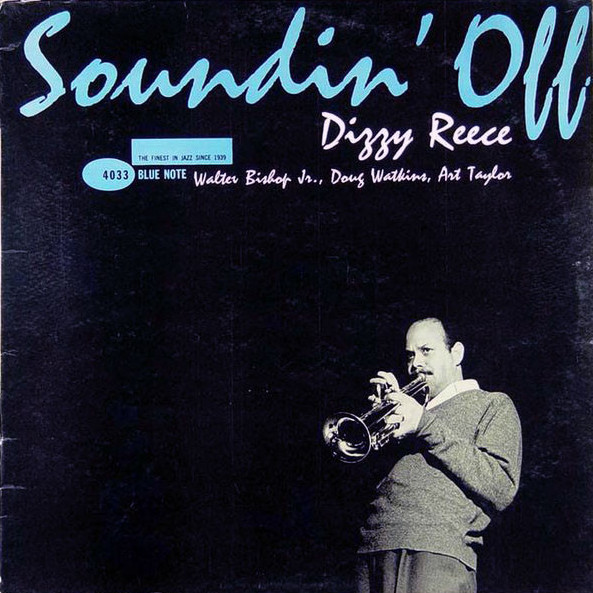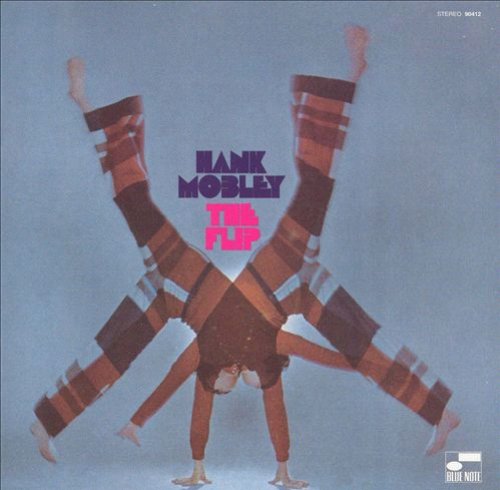The pieces of the puzzle fell into place for trumpeter Dizzy Reece on his third Blue Note album Soundin’ Off from 1960.
Personnel
Dizzy Reece (trumpet), Walter Bishop Jr. (piano), Doug Watkins (bass), Art Taylor (drums)
Recorded
on May 12, 1960 at Van Gelder Studio, Englewood Cliffs, New Jersey
Released
as BLP 4033 in 1960
Track listing
Side A:
Ghost Of A Chance
Once In A While
Eb Pob
Side B:
Yesterdays
Our Love Is Here To Stay
Blue Streak
Mr. Reece is still active these days at the ripe old age of 88. What’s more, performances of Dizzy Reece’s music, Routes In Jazz, have been held last January under the leadership of Trevor Watkins in the United Kingdom to much acclaim. 2019, Cool Britannia caught in the stereotypical web of contemporary polarization, a world away from 1948, when the young Kingston, Jamaica-born Reece set foot first in liberated Paris then the rebuilding war victor, the U.K., where fish and chips was everyone’s requested Last Meal and Stoke-On-Trent a place that played hide and seek with Sheffield under clouds of factory smoke. The talented Reece somehow caught the attention of Blue Note and recorded his debut as a leader, Blues In Trinity, with Donald Byrd, Art Taylor and a British crew including powerhouse tenorist Tubby “Tubbs” Hayes.
Reece moved to New York City in 1959 and, winning fans like Miles Davis and Sonny Rollins, soon found himself in the studio of Rudy van Gelder at Englewood Cliffs, New Jersey. Initially, Reece recorded with a quintet including Hank Mobley, a session that spawned Star Bright. Then Blakey was behind the kit, Stanley Turrentine on tenor saxophone, Bobby Timmons on piano and Jimmy Merritt on bass. The result: Comin’ On, recorded in 1960 but not released until 1999. Great album. Great line-up. In fact – in case you haven’t figured it out yet – Reece and Turrentine fronted a bonafide Jazz Messengers rhythm section. The explosive Blakey regularly pushes the guys to the brink, Reece holding his own pretty darn well.
However, I have warmer feelings for Soundin’ Off. The relaxed but probing rhythmic flow of drummer Art Taylor, bassist Doug Watkins and pianist Walter Bishop Jr. and the fact that Reece is the sole horn gives the trumpeter ample opportunity to let his true voice ring. A voice gay here, mournful there, tender, witty, sexy. Sexy enough to seduce audiences in the Big Apple, yet because of lack of opportunities Reece re-settled in jazz-minded Europe eventually. In a 2004 Jazz Times interview Reece said that he also got negative feedback on his integrated marriage.
Reece favors expressive statements over speed trials, wrapping his loving arms around ballads like Ghost Of A Chance, ridin’ on the blue notes of Once In A While with sleazy slurs, swinging smoothly on medium-tempo tunes like the Monk-ish Reece original Eb Pob – Ecaroh, Airegin, Eb Pob… Those modern jazz guys knew their way with wordplay. The nimble and occasionally locked-hands-lines of Bishop Jr. and the jubilant Reece make Yesterdays absolutely irresistible.
Sweet but with a lot of spunk. The way we like our hard bop artists from the Blue Note roster.
The album is part of a compilation package on Spotify, starts with track 13, up to 18. Listen below.



